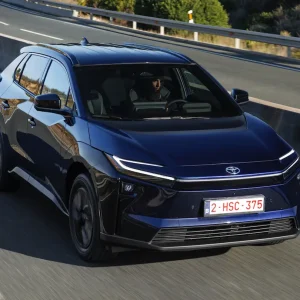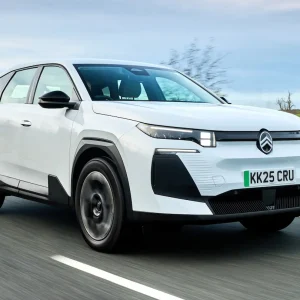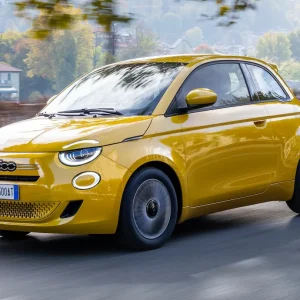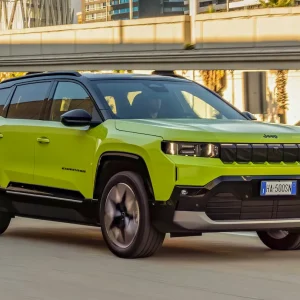2021 seemed like a renaissance year for DS, with new UK managing director Jules Tilstone at the helm together with his Elevation 2021 plan producing results. 2021 also gave us a new range-topper with the DS9, which we first drove in the summer of last year, but thanks to the ongoing semiconductor crisis, the first UK cars have only just reached UK soil.
Available with a 225hp Puretech 1.6-litre petrol, plus a E-Tense plug-in hybrid version, also with 225hp. DS has recently added a 360hp, all-wheel drive, plug-in version which we’ve not yet driven. DS still assumes that 80% of DS9 sales will be to fleet, and we had probably what is the most relevant model – the cheapest version of the E-Tense 225 plug-in, in Performance Line + spec. That’s if you can call a car that costs almost £43,000 entry-level!
Outside from the front, even in our test car’s pearlescent pearl white paint – the DS9 stands out. It does this with the metal detailing on the bonnet, leading into the big family diamond grille and large “DS” badging, distinctive DS Active Vision headlights with the light internals that spin around when you unlock this car, finally there are unusual vertical LED running lights that curve their way up the bumper like snakes.
At the side, the DS9 gets a high beltline, with plenty of smooth surface detailing and flush door handles. The back is the most conventional part of the DS9’s design, although the diamond-pattern rear lights, spoiler, and extra chrome detailing help. Our favourite features are the circular indicators at the top of the rear screen in the C-pillars, which are a neat visual reference to the original Citroen DS.
Inside, the dashboard design reminds us of the DS7 SUV. Highlights include the revolving BRM clock, which is right at the top of the dashboard and the large touchscreen which dominates the centre console. The infotainment system is disappointing, as apart from the graphics, the operating system is the same as that fitted to much cheaper Citroen and Peugeot models. Like them, it is sometimes very slow to start up and work. Personally, we’re not fans of all the Alcantara that covers the seats and other key touchpoints either, but we’ve got admit it adds to the feeling that you’re driving something special.
Space in the front is excellent, the seats are comfortable and supportive. However, all the stylised controls on the centre console are poorly laid out and it is hard to tell what they are. Space in the back is impressive too, with welcome extra knee room, as despite sharing the EMP2 platform with the Peugeot 508, this architecture is stretched to 4,930mm. There is also a practically shaped, 510-litre boot.
The DS9’s E-Tense powertrain is made up of a 180hp, 1.6-litre four-cylinder petrol engine, combined with a 110hp electric motor and 11.9kWh battery pack that’s located underneath the rear seat. Charging-wise, the DS9 takes just under two hours from a 7kW wall box.
On the road, like its Citroen C5X sister car, the DS9’s focus is more on comfort than dynamism, which almost seems at odds with the Performance Line branding. Clever Active Scan suspension, which as the name suggests scans the road ahead to give an impressively smooth ride, works well here. The DS9 is also fitted with 3.6mm-thick acoustic glass, which surprises by just how much this has an effect on reducing exterior and engine noise. The steering is reasonably precise, but the soft ride equals some bodyroll in corners – although there’s still plenty of grip from the standard 19in wheels.
There are five drive modes, but Comfort, Sport, Electric and Hybrid make the most difference to this car. Comfort gives the comfiest of settings and is where the DS9 is most at home; Sport remaps the throttle and stiffens the ride, although you’re only aware of the throttle changes. Electric does what it says and is an electric-only mode, which is at its best in town where you can make the most of the claimed 30 miles of range. While the Hybrid mode is where the DS9 shuffles petrol and electric power reasonably seamlessly.
DS is yet to be recognised in the executive class, plus the lack of supply thanks to the semiconductor crisis can’t have helped, and the DS9 is up against some tough, well-established opposition. However, this car looks different and attractive, is impressively refined to drive and there is no question that it is well-equipped. A credible alternative, we wish it well.
DS9 1.6 E-Tense PHEV Performance Line +
P11D: £46,045
Residual value: 32.1%
Depreciation: £31,249
Fuel: £1,606
Service, maintenance and repair: £2,647
Cost per mile: 59.17p
Fuel consumption: 256.8mpg
CO2 (BIK %): 33g/km (12%)
BIK 20/40% a month: £92/£184
Luggage capacity: 510 litres
Engine size/power: 1,597cc/225hp





